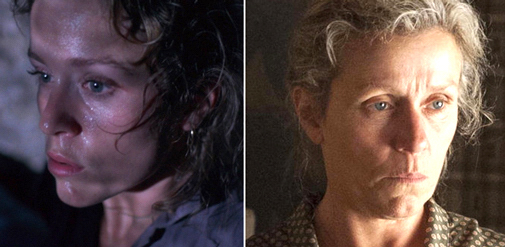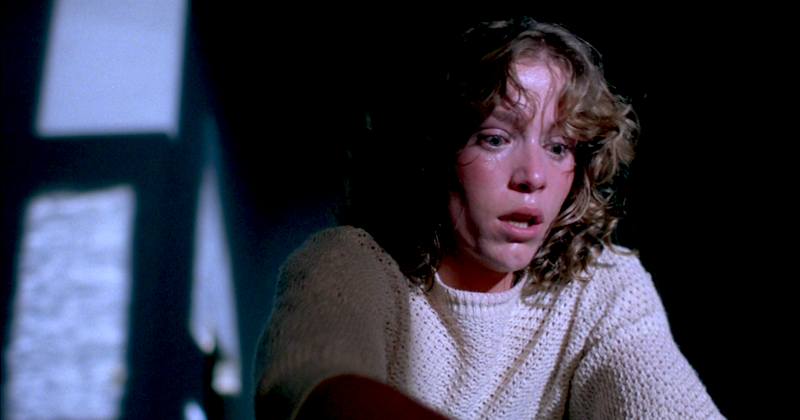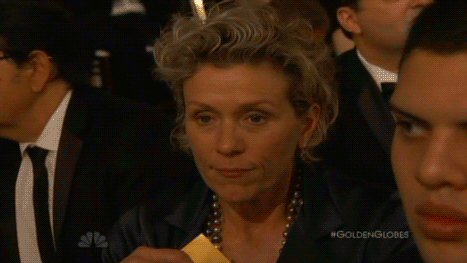1984 is our year of the month for August. Here's Matthew Eng to talk about a treasured actor that made her on camera debut back then...
For the better half of her nearly four-decade film career, Meryl Streep has managed to compel generations of moviegoers to accept a self-styled character actress as not only an acting heroine for the ages but also a bona fide movie star with mass-market appeal and unimpeachable box office credentials. Like no other actress since Bette Davis, Streep has perfected a once-unfeasible practice of playing the sort of idiosyncratic women she has always drifted towards, but within the safe confines of midrange, studio-supported moviemaking that seems to satisfy audience expectations as well as her own.
Sometimes Streep’s projects—and, it must be said, Streep herself—can disappoint. For every quietly graceful gem (like her underrated Hope Springs performance) or skillfully uninhibited turn (as in the best passages of It’s Complicated), there are another two or three within Streep’s latter-day canon that could stand some sharper finesse or at least more dexterous directorial guidance. Whenever I’m let down to by Streep, I can’t help but wonder what one of her less-viable peers might do with the opportunities that are scarce for any actress born before the Kennedy administration and which Streep barely has to put up a fight for.
 The Beginning: Blood Simple (1984); The Most Recent Triumph: Olive Kitteridge (2014)
The Beginning: Blood Simple (1984); The Most Recent Triumph: Olive Kitteridge (2014)
For as long as I can remember, Frances McDormand has served as the purest and most intimidating embodiment of what a character actor should be. “That woman has no vanity,” my mom remarked with clear admiration after watching her in Lisa Cholodenko’s Olive Kitteridge, where McDormand delivers one of the decade’s most masterful star turns, a perfectly prickly meeting of actor and role that might have been a surefire Oscar winner had the project aimed for a bigger screen...
 McDormand’s lack of vanity is one of her hallmarks, in and out of character. Whenever an actor steps out with a slightly, um, altered facial appearance, I am instantly reminded of McDormand’s indelibly vehement take on plastic surgery and performers who “mutate” themselves. On screen, McDormand remains a fearless embodier of characters that read as the top items on an agent’s “Do Not Play” list: frumps, kooks, blowhards, and moms perpetually remain her stock-in-trade.
McDormand’s lack of vanity is one of her hallmarks, in and out of character. Whenever an actor steps out with a slightly, um, altered facial appearance, I am instantly reminded of McDormand’s indelibly vehement take on plastic surgery and performers who “mutate” themselves. On screen, McDormand remains a fearless embodier of characters that read as the top items on an agent’s “Do Not Play” list: frumps, kooks, blowhards, and moms perpetually remain her stock-in-trade.
McDormand has never pretended to be a genuine star and she isn’t exactly a Streep-level chameleon. Her style feels more unusual and somewhat sidelong: she doesn’t so much disappear into her characters as wear them, trying on personal quirks, physical movements, and accents until she finds items that comfortably fit the character, rendering her real through her own unfailing ingenuity. Few actors can deepen “types” with the committed creativity and infectious watchability that have made McDormand such an enduring industry figure, even though she so seldom steps outside its sidelines. It’s sad but not even remotely surprising that after nabbing a Best Actress Oscar for one of the most iconic lead performances in film history, McDormand went directly back to playing supporting characters. After the most ascendant moment in any actor’s career, there were no star vehicles specially designed for her, no savory lead roles to sink her teeth into. In the years directly following Fargo, McDormand continued to play second, third, and even fourth fiddle in so many of her movies, with a few alluring deviations from game and often female indie collaborators.
Through her continued work with Joel and Ethan Coen, McDormand has unquestionably earned herself a place in the film studies textbooks, even though this unending partnership tends to expose some of her shakier instincts. Marge Gunderson is one of American cinema’s most treasured oddities and for good reason, but there’s something increasingly distancing about these other auteurist collaborations. McDormand’s personal biases are on full display in Burn After Reading, in which the actress contributes one of her coldest characterizations as a blonde, surgery-obsessed trainer, mercilessly exaggerating every aspect of her performance until all that is left is the punchline. Even in comparably minor parts in Raising Arizona and Hail, Caesar!, McDormand seems to stand outside her characters, not entirely holding them in disdain but concealing the animated eloquence of Fargo’s Marge, whose peculiarities never come at the cost of her inherent dignity.
Maybe it makes sense, then, that one of my favorite McDormand roles is one of her most uncommonly muted. The first time audiences ever saw McDormand on screen, in the Coens’s electrifying Blood Simple, she was little more than a silhouette, riding through the rain in a passenger seat, the night cloaking all but her hair. You can barely see her, but even in the dark, there is such evident composure to her physicality and a calmness to her light drawl that never betray the nerves of an actress just barely out of the Yale School of Drama, but evoke the relaxed and confident aura of a seasoned performer who appears to have been doing this for years.
The further one travels through McDormand’s filmography, the more anomalous Blood Simple looks in comparison. McDormand plays Abby Marty, a Texan trophy wife who leaves her brutish bar-owner husband (Dan Hedaya) for one of his bartenders (John Getz), setting into motion a deadly spiral of schemes and suspicions. Too unassuming to be a femme fatale, Abby is more like a final girl who doesn’t fully comprehend the horror film she’s in. Like Streep’s Linda in The Deer Hunter, it’s a role that McDormand would scarcely play again: the near-silent ingenue amid a group of hulking men who make the movie’s most decisive actions and come to define almost every quality of their most visible female bystander.
Streep was famously wary of the wispy but heartbreaking Linda, a role she only took to be with dying boyfriend John Cazale. While not necessarily displeased with Abby or Blood Simple, McDormand at least sounds relatively dismissive of the performance that launched her career. In a 1995 interview with Willem Dafoe in BOMB Magazine, McDormand had this to say about her contribution to the film:

In Blood Simple, the only choice I made was not to be theatrical. I never moved my face and my mouth’s always open like I’m terrified—I was a lot of the time. I just did whatever they told me to do, which was perfect for the character, but it’s not like I made that decision as a character choice. It was from not knowing what to do.”
It’s true that, on paper and even occasionally on screen, Abby comes across as a bit of a drab creation, staring with her mouth agape and awaking in cold-sweated terror at the peril encircling her. The Coens ultimately reveal her to be Blood Simple’s most resourceful figure during the film’s unsparing final showdown, which places Abby at its center, but even at this point our knowledge of the character is almost the same as when the movie started. McDormand’s task, then, is to not only suggest a more complex woman beyond the tight frame of the story but inspire an audience to actually care about this woman’s well-being without an entire life’s history to rely on.
What emerges is McDormand’s most emotionally pristine performance, an achievement of digging just deep enough into a blurry character’s concealed interior and retrieving coherent character details from what could have been an incomprehensible persona. As she herself suggests, McDormand is an apt and inspired supplier of abject terror, but she finds more interesting notes to play as well. She evokes carnal ease, a side we wouldn’t see again until Laurel Canyon nearly twenty years later, but also gentle concern for the new man in her life, dispirited mystification when he mysteriously retreats, and growing frustration for being so carelessly kept in the dark. She doesn’t slather on these affects as a first-time performer fighting to make an impression might be liable to do, but glides into them, playing a normal woman trapped within a tangled and trying web of deceit, as opposed to an idea of one. Abby is the face of survivalism by Blood Simple’s end, but it’s through McDormand’s efforts that we feel the bitter, human cost of such survival.
It’s an absorbing piece of acting and a corker of a debut that would have certainly been an enlivening addition to AMPAS’s especially sleepy roster of supporting actresses that year. McDormand would quickly go on to play weirder, louder characters over the course of her career, but I can’t help returning to Abby, whose stark power is as much an attribute of the character as it is of her portrayer.

It has been exceedingly fun to watch McDormand eclipse Tommy Lee Jones for the best grumpy, GIF-ready reaction shots at award shows, even as I continually wish that this level of interest could be applied to her actual acting efforts, which are still too few and far between. I wish she were a more obvious contender for the sort of stage-to-screen roles like Sister Aloysius and Violet Weston that Streep has a neverending monopoly on. If Hollywood remotely cared about working-class Boston women when they aren’t the mothers of famous boxers or abducted children, a screen reprisal of McDormand’s Tony-winning performance in David Lindsay-Abaire’s phenomenal and timely Good People would be a no-brainer. McDormand’s tenacious shepherding of Olive Kitteridge remains an invigorating instance of an actress grabbing her own opportunity, but surely there are other filmmakers who are eager to build projects around McDormand’s gutsy and specific gifts.
Even if she appeared with the frequency of a Daniel Day-Lewis, she would always belong to an eminent breed of hard-working, no-nonsense actresses whose tremendous talents were instantly evident from their very first frame. She continues to be a mainstay in an industry that never fully knew how to spotlight her and has driven so many of the women she came up with into early obscurity. But not her. Even when the odds are discouraging, Frances McDormand has a triumphant way of evading defeat, not unlike the very first character she gave cinematic life to and many of the singular creations that have followed thereafter. Like Abby, like Marge, and like Olive, Frances McDormand endures.
